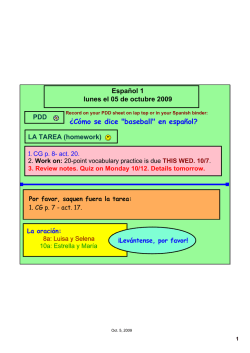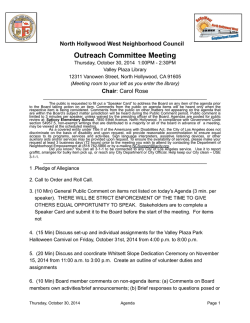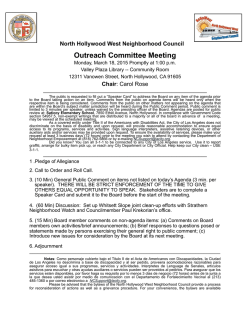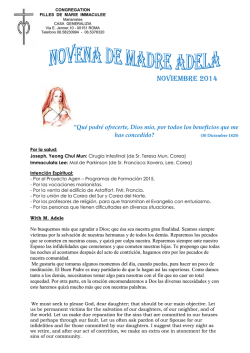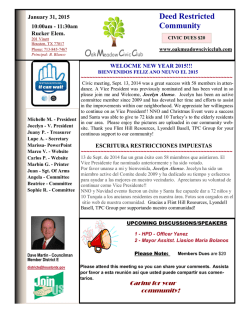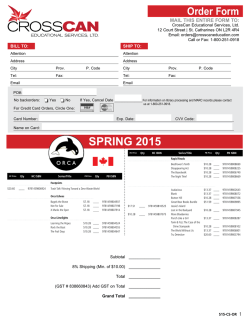
File
1 AP Spanish Summer Assignment Skyline High School Summer 2015 ¡Felicitaciones! It is commendable that you have chosen to continue your study of Spanish through the AP level. As you know, the purpose of this course is to have you ready to excel on the AP Spanish Language Exam that will be administered in May of 2016. The AP Spanish Language Exam is designed to test your skills in order to see how well they meet the skill levels that one would expect to find in a third year college class. The exam will test all of the major language skills: reading comprehension, writing skills, speaking ability, and listening comprehension, in addition to thematic cultural knowledge of the Hispanic world. New to the exam next year include the themes of global challenges, science and technology, contemporary life, personal and public identities, families and communities, and beauty and aesthetics. You will build a binder portfolio of these themes throughout the school year so you may want to start by collecting any prior work that you have from Spanish 4AC that fits into the categories. This will be your ultimate exam study guide and showcase of all of your hard work in Spanish! There are still grammar concepts we will study during the school year that will be new to you. For these reasons, you need to use the summer to solidify what you already know. Since the exam focuses on all major language skills, it is also important for you to continue building your proficiency in all areas. Remember, learning a language is like learning to play a sport or how to play an instrument—you have to practice all the skills if you want to play well. Building skills only occurs through practice. Ideally, you would have had this assignment prior to leaving for the summer; as a result of receiving it later, I am assigning the most basic review to keep you practicing. Your assignment is completely feasible and can be tailored to your own interests. Also keep in mind that the topics you choose will be used in your first 5AP group project so pick things that you can work with in a presentation! NB: ALL SUMMER WORK needs to be uploaded to your Spanish website (that we created in 4AC ). I will email you instructions on how to update it to make sure your website is ready for 5AP! Please create a SEPARATE SUB-PAGE IN THE WEBSITE (where you have the 6 AP themes) called “Tarea de verano 2015”. This is the ONLY place I will look for and grade your summer work. Make sure everything you put on your website is “anyone with the link can view.” Do NOT share your work and fill up my GoogleDocs please or you will not get credit! Part I: Reading, Writing, Cultural Awareness and Current Events Over the duration of this course, you will become an expert on a country of your choosing. We would prefer that each person choose a different country, but this is hard to do not having the class lists for next year . Please pick a country other than the usual Mexico and Spain. Your country must be a Spanish- speaking country (not Portuguese or English). Near the beginning of the year, you will be required to present basic information about your country to the class and explain why you chose it. Summer responsibilities: Select your country then find six news articles in Spanish about your country, one per theme, which again include: global challenges, science and technology, contemporary life, personal and public identities, families and communities, and beauty and aesthetics. Your reports on each article will follow the same format; the forms are included at the end of this assignment (and also emailed to you). Please type this information and follow my format or you will not receive credit. Theme of the article: Title of article: Source of article: Original publication date of article: (For now, please limit yourself to 2014-2015) Summary: Five to seven sentences explaining the basic information of the article, written in Spanish without copying directly from the article. Vocabulary: A list of five words from the article that are new to you. Define them in Spanish using words YOU understand. (Required) You may also include the English meaning if you wish. (Optional) 2 Where to find these articles? Google/Google en español your country name and the word “periódico;” CNN, MSNBC, BBC—major news outlets that also maintain Spanish language sites Hispanic news outlets like Univisión, Galavisión; Google “Spanish language newspapers” and find one from a major city (El Nuevo Herald, is a good one which is connected to the Miami Herald.) Remember: you are looking for news, not wikipedia-style info, not personal websites Your sources should be reputable. If in doubt, consult me. Part II: Listening Skills You will need to spend a minimum of 5 hours listening to authentic Spanish this summer, preferably in 30 minute increments. You may listen to the radio, CDs, streaming radio, podcasts or TV. You will keep a log of exactly what you listen to, when you were listening to it and for how many minutes. You will need to document 5 separate instances of listening activity. Please again list what theme each listening pertains to in the listening log. For each entry of your listening log, you will write a short reflection in Spanish indicating the content, difficulty of listening and your interest in that source. (Minimum of 3 sentences.) (In other words, one three-hour soccer match cannot count three hours towards your total. It can count for up to one hour.) I recommend you try and find at least 3 different themes to connect with your listening activities. Music cannot be the only resource you use for this activity. Please have a minimum of 2 different listening resources (such as the radio, Youtube, TV, etc). Suggestion: Find something that interests you—sports, a soap opera, and game shows. News on the radio or TV will be the hardest to understand, but also the most useful. If you can find a show that you enjoy watch it several times. If you like sports, watch sports. You must have a minimum of THREE different types of audios (this means, you cannot ONLY listen to soccer matches, for example). Give yourself time. It will take your ear a long time to adjust. You won’t understand everything, but you’re not supposed to. The goal is to understand enough to know what’s going on. Telenovelas or soap operas are great— because the same action/situation gets repeated over and over and over! Do this on a weekly basis. Do not do all 5 hours in one day or you will not receive full credit. PLEASE USE THE ELECTRONIC LISTENING LOG FORM I PROVIDED YOU IN EMAIL! Part III: Speaking Skills There is no specific assignment here, but it would be in your best interest to attempt to speak some Spanish with someone over the summer. Get into the community and meet people—at restaurants, churches, Latino markets. Get together with your AP language classmates every couple of weeks for dinner or coffee just to talk in Spanish. Keep a log of this (date, time, length, 3 sentence reflections on your topics) and your conversation topics for extra credit. Part IV: Reading/Writing How can I pass the AP Spanish exam? The AP exam is a very difficult exam. Many college students would not even pass the test. If you are considering taking the AP test before graduating, the single most important factor that helps students pass the exam is reading comprehensible material often and thoroughly. Due to the difficulty of the test you will also engage in a rigorous summer reading program. In order to have a high degree of success, you’ll need to read this summer. Typically, those students who have read during the summer have returned in September as more advanced readers. Students who have scored a 4 or 5 on the AP have stated that they read 2-3 novels during the summer. Turn in running vocabulary lists from each book in September. You may donate the book to my room library in September for an extra credit coupon. Questions? E-mail me: [email protected]. Because you will be reading articles in Spanish, you are only required to read one book this summer. You are expected to keep a journal of your reading. This means you need to write a short summary of each chapter (5 sentence minimum per chapter) and keep a running vocabulary list in Spanish and English of new words you encounter. 3 The following list contains some suggested titles. It is best to read something you are interested in, so take great care in selecting your book. Most of these selections can be purchased online, but the Ann Arbor Public library has approximately 650 books available in Spanish. You can view their selection at: http://www.aadl.org/catalog/search/callnum/%22World-SPA-Fiction%2B%22 Summer Reading list: (Alphabetical by Author's Last Name) ** Las cinco personas que encontrarás en el cielo, por Mitch Albom, ISBN: 14013-0172-X, Publisher: Hyperion. A story of the hidden influences that we have on one another's' lives. El reino del dragón de oro, por Isabel Allende, ISBN: 0-06-059171-4, Publisher: Rayo (Harper-Collins). La ciudad de las bestias, por Isabel Allende, ISBN: 0-06-051032-3, Publisher: Rayo (Harper-Collins). El bosque de los pigmeos, por Isabel Allende, ISBN: 0-06-076219-5, Publisher: Rayo (Harper-Collins). Zorro, por Isabel Allende, ISBN: 0-06-077901-2, Publisher: Rayo (Harper-Collins). Antes de ser libres, por Julia Alvarez, ISBN: 0375815457, Publisher: Laurel Leaf. En el tiempo de las mariposas (In the Time of Butterflies), por Julia Alvarez, ISBN: 0452279968, Publisher: Plume. Cuando tía Lola vino (de visita) a quedarse, por Julia Alvarez, ISBN: 0-37581552-X, Publisher: Dell. ** Bendíceme, Última (Bless me, Ultima), por Rudolfo Anaya, ISBN: 0-44660077-2, Publisher: Warner. Lazarillo de Tormes (Kaplan Vocabulary-Building Novel), por Anonymous, ISBN: 0-7432-6284-0, publisher: Simon & Schuster. This particular novel is a simplified version of the classic Spanish tale of a poor but clever orphan and his adventures, which poke fun at the foibles of the upper classes. It is the original picaresque novel whose main character is similar to Little Orphan Annie, Huckleberry Finn, or Oliver Twist. Tuck para siempre (Tuck Everlasting), por Natalie Babbit, ISBN: 0374480117, Publisher: Farrar, Straus and Giroux. Reading Level: 5.0. What if the fountain of youth were real and some of us could live forever? Would you choose to or not? This delightful story is a bout a girl that has the opportunity with a young/old boy. Better than the movie. ** Stories from Mexico/Historias de México, por Genevieve Barlow & William N. Stivers, ISBN: 0-8442-0811-6, Publisher: Passport Books/NTC. Contains 16 Mexican legends in a bilingual format that covers 1,500 years of history and mythology from pre-Columbian times to the Spanish colonial era and later. Odisea del norte, por Mario Bencastro, ISBN: 1-55885-266-2, Publisher, Arte Público Press La tregua, por Mario Benedetti, ISBN-13: 978-9707311169, Publisher: Punto 4 de Lectura (May 2006) 202 pages. ** La Cruz del diablo (vocabulary-controlled version), por Gustavo Adolfo Bécquer, ISBN: 84-294-3421-6, Publisher: Santillana. A simplified version of a folktale from medieval Spain as portrayed by the famous Spanish romantic poet. El código DaVinci (The DaVinci Code), por Dan Brown ISBN: 84-95618-60-5, Publisher: Umbriel. The Spanish translation of the popular novel. ** La Casa en Mango Street, por Sandra Cisneros, ISBN: 0-679-75526-8, Publisher: Vintage. Reading Level: 4.5. El arroyo de la Llorona y otros cuentos, por Sandra Cisneros, ISBN: 0-67976804-1 Ramona la chinche (Ramona the Pest), Beverly Cleary, ISBN: 0-688-14888-3, Publisher: Rayo. Reading Level: 5.1. ** El Alquimista, por Paulo Coelho, ISBN: 0-06-251140-8 Publisher: Rayo. El demonio y la senorita Prym, por Paulo Coelho, ISBN: 956-258-114-4, Publisher: Editorial Grijalbo. La quinta montaña, por Paulo Coelho, ISBN: 0-06-093012-8, Publisher: HarperLibros (Harper Perennial). Veronika decide morir, por Paulo Coelho, ISBN: 0-06-001193-9, Publisher: Rayo (Harper Collins). La Catrina, por David Curland, ISBN: 0-673-21588-1, Publisher: Scott Foreman Addison Wesley. La Catrina el último secreto, por David Curland, ISBN: 0-673-21846-5, Publisher: Prentice Hall. Me llamo Bud, no Buddy, por Cristopher Paul Curtis, ISBN: 84-241-86-38-9. Charlie y la fábrica de chocolate, por Roald Dahl, ISBN: 8420447714, Publisher: Santillana. Como agua para chocolate, por Laura Esquivel, ISBN: 0385721234, Publisher: Anchor. ** El regalo de Navidad (The Christmas Gift), por Richard Paul Evans, ISBN: 0-68481554-0, Publisher: Simon Schuster Libros en Español. ** Aura, por Carlos Fuentes, ISBN: 374-51171-3, Publisher: Farrar, Strauss, Giroux. This is a short novel written completely in the second person singular (the tú form). It is mysterious and a quick read (5 chapters, total of 65 pages). Cajas de cartón, por Francisco Jiménez ISBN: 0-618-22616-8, Publisher: Houghton Mifflin ** Senderos Fronterizos (Continuación de Cajas de Cartón), por Francisco Jiménez, ISBN: 0-618-22618-4, Publisher: Houghton Mifflin. ** El presente (The Present), por Spencer Johnson, ISBN: 968-191334-5, publisher: Aguilar ¿Quién se ha llevado mi queso? (Who Moved my Cheese?), por Spenser Johnson, ISBN: 84-7953-338-2, Publisher: Ediciones Urano, 1999. 5 La caseta mágica (The Phantom Tollbooth), por Norton Juster, ISBN: 1-58717-109-0, Publisher: SeaStar Books. Reading Level: 6.7. La gran aventura de Alejandro, por Abby Kanter, ISBN: 0-87720-135-8, Publisher: Amsco. This is a lower level book for Spanish 2, but it is a good review of the history and literature of Spain, told in the form of a story about a boy who is given a magic ring. Viviana y su gran aventura mexicana, por Abby Kanter, ISBN: 1-56765-475-4, Publisher: Amsco. This is a lower level book for Spanish 2, but it is a good review of the history and literature of Mexico, told in the form of a story about a girl who has a magic ring. Una arruga en el tiempo (A Wrinkle in Time), Madeleine L'Engle, ISBN: 8420440744, Publisher: Alfaguara Ediciones, S.A. (Spain). ** El leon, la bruja, y el ropero (Las Crónicas De Narnia), por C.S. Lewis, ISBN: 0-06-008661-0, Publisher: Rayo. Reading Level: 5.7. El Principe Caspian (Las Crónicas De Narnia) por C.S. Lewis, ISBN: 0060884282, Publisher: Rayo. Reading Level: 5.7. La Silla de Plata (Las Crónicas De Narnia) por C.S. Lewis, ISBN: 0060884304, Publisher: Rayo. Reading Level: 5.7. La Última Batalla (Las Crónicas De Narnia) por C.S. Lewis, ISBN: 0060884312, Publisher: Rayo. Reading Level: 5.6. Me llamo Rigoberta Menchú y así me nació la conciencia, por Rigoberta Menchú, ISBN: 9682313155, Publisher: Siglo XXI. The autobiography of a of the Nobel-prize winning Guatemalan woman. Although some of what she wrote has since been proven to be embellished, it is still an interesting read. Isla de luz, por Elías Miguel Muñoz, ISBN: 0-07-232616-6, Publisher: McGraw/Hill. The story of the history of an imaginary Caribbean country. Contains pictures, historical and cultural information, glossing of more difficult words, a glossary and an introduction by Stephen Krashen. ** Ladrón de la mente, por Elías Miguel Muñoz, ISBN: 0-07-232617-4, Publisher: McGraw/Hill. A mystery about a mental/emotional vampire set in modern-day Spain. Contains pictures, historical and cultural information, glossing of more difficult words, glossary and an introduction by Stephen Krashen. Viajes fantásticos, por Elías Miguel Muñoz, ISBN: 0-07-231009- X, Publisher: McGraw/Hill. Two short stories written in the Latin American magical realism style, one about the conquest of the Aztecs from the perspective of an Aztec warrior, and another about contemporary Puerto Rico. Contains pictures, historical and cultural information, glossing of more difficult words, a glossary and an introduction by Stephen Krashen. Una Nota Falsa (from the Lola Lago series, this is the version with CD), por Lourdes Miguel & Neus Sans, ISBN: 84-8443-129-0, Publisher: Difusión. ** Esperanza renace (Esperanza Rising), por Pam Múñoz Ryan, ISBN: 0-439-39885-1, Publisher: Mariposa (Scholastic) Es una novela acerca de una familia adinerada mexicana que tienen que venir a California en los años 30 para trabajar como campesinos. Es simple, pero tiene mucho que decir a los alumnos. Un caballo llamado Libertad (Riding Freedom), por Pam Múñoz Ryan, ISBN: 0-439-23761-0, Publisher: Scholastic en Español. ** El hacha (Hatchet), por Gary Paulsen, ISBN: 8427932065, Publisher: Lectorum Publications. Reading Level: 5.7. El cuento de la isla desconocida, por José Saramago, ISBN: 8-420-47840-7. Publisher: Alfaguara. 6 ** Un viejo que leía novelas de amor, por Luis Sepulveda, ISBN: 978-0140271416. Publisher: Penguin. Cuenta solamente 130+ paginas. Se trata de un ecuatoriano que se traslada de la sierra a la selva amazónica y aprende mucho de los indígenas. El argumento es bastante emocionante porque se trata de una tigrilla que mata a algunos hombres. Al fin el viejo tiene que enfrentar la tigrilla. Los estudiantes aprenden mucho de los problemas sociales, políticos y ambientales de Sudamérica sin que el libro predique a ellos. Es un libro de bastante acción con personajes fuertes. A mis estudiantes les encanta este libro. Cebollas enterradas, por Gary Soto, ISBN: 968-16-6669-0, Publisher: Fondo de Cultura Económica, 2002. ¿Dónde está Eduardo? , por Blaine Ray y Lisa Ray Turner, ISBN: Publisher: Command Performance Language Institute & Blaine Ray Workshops. Mi propio auto, por Blaine Ray y Lisa Ray Turner, ISBN: 0-929724-74-7, Publisher: Command Performance Language Institute & Blaine Ray Workshops El viaje perdido, por Blaine Ray y Lisa Ray Turner, ISBN: 0-929724-59-3, Publisher: Command Performance Language Institute & Blaine Ray Workshops Viva el toro, por Blaine Ray y Lisa Ray Turner, ISBN: 0-929724-48-8, Publisher: Command Performance Language Institute & Blaine Ray Workshops. ...y no se lo tragó la tierra, por Tomás Rivera, ISBN: 1-55885-083-X, Publisher: Arte Público Press. ** Harry Potter y la piedra filosofal (Harry Potter and the Sorcerer's Stone), por J.K. Rowling, ISBN: 84-7888-654-0, Publisher: Salamandra. Reading Level: 5.5. Harry Potter y la cámara secreta (Harry Potter and the Chamber of Secrets), por J.K. Rowling, ISBN: 84-7888-656-7, Publisher: Salamandra. Reading Level: 6.7. Harry Potter y el prisionero de Azkaban (Harry Potter and the Prisoner of Azkaban), por J.K. Rowling, ISBN: 84-7888-655-9, Publisher: Salamandra. Reading Level: 6.7. Harry Potter y el cáliz de fuego (Harry Potter and the Goblet of Fire), por J.K. Rowling, ISBN: 84-7888-646-X, Publisher: Salamandra. Reading Level: 6.8. Harry Potter y la Orden del Fénix (Harry Potter and the Order of the Phoenix), por J.K. Rowling, ISBN: 84-7888-884-5, Publisher: Salamandra. Reading Level: 7.2. Harry Potter y el misterio del principe (Harry Potter and The Half-Blood Prince), por J.K. Rowling, ISBN: 84-7888-993-0, Publisher: Salamandra. Reading Level: 7.2. El principito (The Little Prince), por Antoine de Saint-Exupéry, ISBN: 0-15-6284502, Publisher: Harcourt Brace & Company. Reading Level: 5.0. Los ojos del perro siberiano, por Antonio Santa Ana, ISBN: 9580443912, Publisher: Grupo Editorial Norma. Stories from Puerto Rico / Historias de Puerto Rico (bilingual) por Martinez Santiago, ISBN: 9-780844-204024 Un Grillo en Times Square (A Cricket in Times Square), por George Selden, ISBN: 0374480605. Reading Level: 4.9. Una serie de catastróficas desdichas (The Bad Beginning), por Lemony Snicket, ISBN: 0-307-20934-2, Publisher: Random House. ** Secretos, por Danielle Steel, ISBN: 1-4000-0095-5, Publisher: Random House Español. As far as I can tell this is just another romance novel, but it must be pretty good—I have not been able to keep a copy of it in my classroom library—female students keep taking and reading it and passing it on to their friends 7 to read and it never seems to make it back to the classroom. La comunidad del anillo (The Fellowship of the Ring), por J.R.R. Tolkien, ISBN: 84-450-7140-8, Publisher: Minotauro. Reading Level: 6.1. El hobbit, por J.R.R. Tolkien, ISBN: 84-450-7141-6, Publisher: Minotauro. Reading Level: 6.6. Las telarañas de Carlota (Charlotte's Web), por E.B White, ISBN: 8427933886, Publisher: Lectorum La casa de la pradera (Little House on the Prairie), por L. E. Wilder, ISBN: 8427931956, Publisher: Lectorum Publications. Better Spanish Reading (Short articles and activities) por Yates, ISBN: 39785-41074 ¿Otras opciones? I am open to a current book such as “Divergent” or “The Hunger Games” etc. in Spanish if you get it preapproved so I know the level is appropriate! Honor Code College students are required to abide by an honor code that forbids them from cheating, lying and stealing, both within the academic world and as members of the college community. We expect the same commitment to honor from you, as a member of a college-level course. What this means is that you are expected to complete all assignments on your own, without consulting native-speakers or translation devices of any kind. Your work should represent what you are capable of doing using as resources your mind, grammar books or notes and a dictionary. If you are not sure about how to utilize an original source without plagiarizing, please see your teacher and we can give you tips. We do not expect your production of Spanish to be without error at this level. • • • Translation devices are prohibited at all times. No one may EVER proof-read your work, suggest changes to your work or make changes to your work unless we have specified these activities within the parameters of peer evaluation. Anyone found in violation of these policies will be subjected to disciplinary action. Check-list: 1) Decide on which country you would like to study for the summer. 2) Start investigating options for listening to spoken Spanish and keep a log with summaries. 3) Choose a book to read for the summer and keep a vocabulary list and chapter summaries in Spanish. 4) Purchase a good Spanish dictionary. The “pequeño Larousse” is a very good dictionary, but there are several other options available from amazon.com; Barnes and Noble; Borders, etc. I also strongly recommend an AP Spanish practice manual test prep book. Make sure it is for the 2016 test (that started last year), as this is a newer test and previous books are no longer applicable to the new test format. 5) Read and Sign the AP Spanish Language contract and bring it to La Sra. Ficano-Petricca in C 308 by June 10th or you could be dropped from the course! 8 AP SPANISH LANGUAGE SUMMER ARTICLE ASSIGNMENT (Please copy this form or use this format for the article assignment) Nombre: ___________________________________________ Tema: :_____________________________________________ País :_______________________________________________ Fecha: _____________________________________________ Artículo # ____ Título del artículo: _______________________________________________________________________________ Fuente original: ________________________________________________________________________________ Fecha de publicación: _________________________________________________________________________________ Resumen: Cuando escribes el resumen, considera las siguientes preguntas: ¿De quién se trata? ¿Qué pasó? ¿Dónde ocurrió? ¿Cuándo ocurrió? ¿Por qué es importante esta información? (o ¿por qué es interesante?) _____________________________________________________________________________________ ____________________________________________________________________________________________ ______________________________________________________________________________ _____________________________________________________________________________________ _____________________________________________________________________________________ _____________________________________________________________________________________ _____________________________________________________________________________________ _____________________________________________________________________________________ _____________________________________________________________________________________ Vocabulario nuevo 1. 2. 3. 4. 5. 9 AP Spanish Language and Culture Skyline High School El año escolar 2015-2016 THIS CONTRACT MUST BE SIGNED AND RETURNED BY WEDNESDAY June 10, 2015 to Mrs. Ficano-Petricca C308 FAILURE TO TURN IN THIS FORM BY THIS DATE WILL DROP YOU FROM THE CLASS! _____ I have read and understand the assigned summer assignments for the AP and I understand that I must notify Sra. Ficano-Petricca by JULY 1ST if I am dropping Spanish 5AP. _____ I have read and understand the assigned summer assignments for the AP Spanish Language Course to be taught at Skyline High School during 2015-2016 and I agree to complete all assignments and have them uploaded into a new tab (“Tarea de Verano”) on my current Spanish website by the first class meeting in September. _____ I understand that if I do not have the following items uploaded to my website during the first class meeting, I will receive a zero for each item that is missing. *See attached rubric for grading* _____ I understand the Honor Policy as described on the Summer Assignment handout and I agree to abide by its terms for the summer assignments and during the 2015-2016 school years. _____ I understand this is a projects-based course and will have to dedicate a lot of time and effort to working with my group members to prepare me for the rigor of the AP exam. I have reviewed the themes and exam format on the other side of this document. _____I agree to take the AP Spanish Language Exam in May 2016. Your name: ______________________________________________________ Your signature: ___________________________________________________ Date: ____________________________________________________________ Parent’s name: ___________________________________________________ Parent’s signature: ________________________________________________ Date: ____________________________________________________________ (Please see an outline of the AP test on the back of this form). Español 5AP Colección de evidencia (portfolio) Señora Ficano-Petricca 10 Nombre: _____________________________ Fecha: _________________ Hora: _____ 1. Página principal (home page) _____ /15 puntos a. El/la estudiante mandó el enlace para su página web en el “GoogleForm” el primer día de la escuela antes de la primera clase. b. Hay una pestaña (tab) que dice “Tarea de verano” que se puede encontrar en la página principal al lado debajo de los otros 6 temas AP fácilmente. c. El/la estudiante NO ha compartido su colección; sin embargo, usó la opción “anyone with the link can view”. d. El/la estudiante cambió el título de la página para decir “Español 5AP” (y no 4AC). 2. Página/enlace de la novela _____ /100 puntos a. El/la estudiante usó el formato correcto (o muy similar) para organizar: i. El título y autor de la novela. ii. Vocabulario (mínimo de 5 palabras de cada capítulo). iii. Resúmenes (un mínimo de 5 líneas de descripción por cada capítulo). 3. Página/enlace del audio _____ /50 puntos a. El/la estudiante tiene 5 ejemplos DIFERENTES de audio 3 TIPOS DIFERENTES de audio en la página (de 2 recursos diferentes). b. Cada audio tiene esta información: qué escuchaste, dónde, cuántos minutos duró. c. Hay un mínimo de 3 oraciones que describen cada de los 5 audios. 4. Página/enlace de los artículos _____ /60 puntos a. El/la estudiante incluyó 6 artículos conectadosa con cada de los 6 temas principales del examen AP. b. Cada resumen está organizado con el formato que Sra FP mandó con esta información: i. Tema, título, fuente, fecha de publicación, 5-7 oraciones de resumen, y 5 palabras de vocabulario con definiciones en español. Puntos totales _____ /225 11 Documentación de audio: Duración Fuente Tema Fecha: del audio: (enlace): AP: Reflexión (3 oraciones mínimas: 12 AP SPANISH LANGUAGE SUMMER ARTICLE ASSIGNMENT (Please copy this form or use this format for the 6 article assignment) Nombre: ___________________________________________ Tema: :_____________________________________________ País :_______________________________________________ Fecha: _____________________________________________ Artículo # ____ Título del artículo: _______________________________________________________________________________ Fuente original: ________________________________________________________________________________ Fecha de publicación: _________________________________________________________________________________ Resumen: Cuando escribes el resumen, considera las siguientes preguntas: ¿De quién se trata? ¿Qué pasó? ¿Dónde ocurrió? ¿Cuándo ocurrió? ¿Por qué es importante esta información? (o ¿por qué es interesante?) _____________________________________________________________________________________ ____________________________________________________________________________________________ ______________________________________________________________________________ _____________________________________________________________________________________ _____________________________________________________________________________________ _____________________________________________________________________________________ _____________________________________________________________________________________ _____________________________________________________________________________________ _____________________________________________________________________________________ Vocabulario nuevo 1. 2. 3. 4. 5. Documentación de leer (novela): Título de la novela: ______________________ Autor: ______________________________ 13 Capítulo 1 Resumen (5 oraciones mínimas): Vocabulario de capítulo 1 Capítulo 2 Resumen (5 oraciones mínimas): Vocabulario de capítulo 2 Capítulo 3 Resumen (5 oraciones mínimas): Vocabulario de capítulo 3 (Continúen con este formato por cada capítulo) 14 Course Themes Designing the AP Spanish Language and Culture course around themes creates an interesting, meaningful context in which to explore a variety of language concepts. Themes help teachers integrate language, content, and culture into an interrelated series of lessons and activities that promote the use of the language in a variety of contexts. A theme may be used to plan a brief unit of study, a comprehensive unit spanning a greater period of time, or to connect with courses in other disciplines. The AP Spanish Language and Culture course is structured around six themes: 15 Throughout the year, students will build an e-portfolio to help answer these themes, contexts, and overarching essential questions: Theme: Global Challenges / Los desafíos mundiales Recommended Contexts: • • • • • Economic Issues / Los temas económicos Environmental Issues / Los temas del medio ambiente Philosophical Thought and Religion / El pensamiento filosófico y la religión Population and Demographics / La población y la demografía • Social Welfare / El bienestar social Social Conscience / La conciencia social Overarching Essential Questions: • What environmental, political, and social issues pose challenges to societies throughout the world? / ¿Cuáles son los desafíos sociales, políticos y del medio ambiente que enfrentan las sociedades del mundo? • What are the origins of those issues? / ¿Cuáles son los orígenes de esos desafíos? • What are possible solutions to those challenges? / ¿Cuáles son algunas posibles soluciones a esos desafíos? Theme: Science and Technology / La ciencia y la tecnología Recommended Contexts: • Access to Technology / El acceso a la tecnología • Effects of Technology on Self and Society / Los efectos de la tecnología en el individuo y en la sociedad • Health Care and Medicine / El cuidado de la salud y la medicina • Innovations / Las innovaciones tecnológicas • Natural Phenomena / Los fenómenos naturales • Science and Ethics / La ciencia y la ética Overarching Essential Questions: • How do developments in science and technology affect our lives? / ¿Qué impacto tiene el desarrollo científico y tecnológico en nuestras vidas? • What factors have driven innovation and discovery in the fields of science and technology? / ¿Qué factores han impulsado el desarrollo y la innovación en la ciencia y la tecnología? • What role does ethics play in scientific advancement? / ¿Qué papel cumple la ética en los avances científicos? Theme: Contemporary Life / La vida contemporánea Recommended Contexts: • Education and Careers / La educación y las carreras profesionales • Entertainment / El entretenimiento y la diversión • Travel and Leisure / Los viajes y el ocio • Lifestyles / Los estilos de vida • Relationships / Las relaciones personales • Social Customs and Values / Las tradiciones y los valores sociales • Volunteerism / El trabajo voluntario Overarching Essential Questions: • How do societies and individuals define quality of life? / ¿Cómo definen los individuos y las sociedades su propia calidad de vida? • How is contemporary life influenced by cultural products, practices, and perspectives? / ¿Cómo influyen los productos culturales, las prácticas y las perspectivas de la gente en la vida contemporánea? • What are the challenges of contemporary life? / ¿Cuáles son los desafíos de la vida contemporánea? Theme: Personal and Public Identities / Las identidades personales y públicas Recommended Contexts: • Alienation and Assimilation / La enajenación y la asimilación 16 • • • • Heroes and Historical Figures / Los héroes y los personajes históricos National and Ethnic Identities / La identidad nacional y la identidad étnica Personal Beliefs / Las creencias personales Personal Interests / Los intereses personales • Self-Image / La autoestima Overarching Essential Questions: • How are aspects of identity expressed in various situations? / ¿Cómo se expresan los distintos aspectos de la identidad en diversas situaciones? • How do language and culture influence identity? / ¿Cómo influyen la lengua y la cultura en la identidad de una persona? • How does one’s identity develop over time? / ¿Cómo se desarrolla la identidad de una persona a lo largo del tiempo? Theme: Families and Communities / Las familias y las comunidades Recommended Contexts: • Customs and Values / Las tradiciones y los valores • Education Communities / Las comunidades educativas • Family Structure / La estructura de la familia • Global Citizenship / La ciudadanía global • Human Geography / La geografía humana • Social Networking / Las redes sociales Overarching Essential Questions: • What constitutes a family in different societies? / ¿Cómo se define la familia en distintas sociedades? • How do individuals contribute to the well-being of communities? / ¿Cómo contribuyen los individuos al bienestar de las comunidades? • How do the roles that families and communities assume differ in societies around the world? / ¿Cuáles son las diferencias en los papeles que asumen las comunidades y las familias en las diferentes sociedades del mundo? Theme: Beauty and Aesthetics / La belleza y la estética Recommended Contexts: • Architecture / La arquitectura • Defining Beauty / Definiciones de la belleza • Defining Creativity / Definiciones de la creatividad • Fashion and Design / La moda y el diseño • Language and Literature / El lenguaje y la literatura • Visual and Performing Arts / Las artes visuales y escénicas Overarching Essential Questions: • How are perceptions of beauty and creativity established? / ¿Cómo se establecen las percepciones de la belleza y la creatividad? • How do ideals of beauty and aesthetics influence daily life? / ¿Cómo influyen los ideales de la belleza y la estética en la vida cotidiana? • How do the arts both challenge and reflect cultural perspectives? / ¿Cómo las artes desafían y reflejan las perspectivas culturales?
© Copyright 2026
